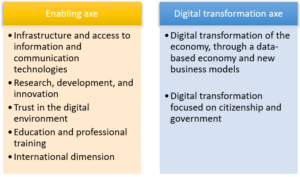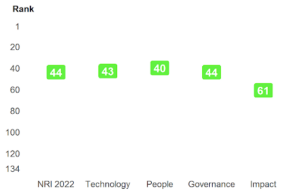Gabriel Souto, Portulans Institute Fellow
The rapid changes in the economy and society brought on by digital transformation pose new challenges to government action, such as the digitization of public services and digital inclusion. For Brazil to take full advantage of the digital revolution, reaping all the benefits that the information and knowledge society has to offer, the national economy must transform itself with dynamism, competitiveness, and inclusion, absorbing digitalization in its processes, values, and knowledge.
A digital benchmark for Brazil
Established by Federal Decree nº 9.319 of 2018, the Brazilian Strategy for Digital Transformation (E-Digital) aims to harmonize the initiatives of the Federal Executive branch related to the digital environment and to take full advantage of the potential of digital technologies. It intends to promote economic development, a sustainable and inclusive environment through innovation, and increased competitiveness, productivity, and employment and income levels in the country.
E-Digital is structured according to the following thematic axes:

The outputs of E-Digital
To assess Brazil’s progress in E-Digital, it is essential to analyze its performance in key areas for digital transformation and how its performance compares to those of other economies. The Portulans Institute’s Network Readiness Index 2022 (NRI 2022) is a key benchmark for this assessment.
Brazil ranks 44th out of the 131 economies included in the NRI 2022. Moreover, Brazil is ranked 4th in the group of upper-middle-income countries, and 4th within the Americas region. Also, Brazil is one of a few select middle- and low-income economies in the Americas that stands out as performing above expected levels of development in Technology, People, and Governance. It outperforms the average in the Americas in eight of the twelve sub-pillars: Access, Content, Businesses, Governments, Trust, Regulation, Inclusion, and Economy. The country’s main strength relates to People, but room for improvement remains in Impact.

Impact: a pillar for improvement
This year, the strongest showings of Brazil relate to Inclusion, Access, and Governments, which encompasses the areas covered by E-Digital and a notable evolution compared to its NRI 2021 ranking of 53rd in Technology, 49th in Governance, and 70th in Impact. Nonetheless, the NRI 2022 finds that more could be done to improve the economy’s performance in the Future Technologies, Individuals, and Quality of Life sub-pillars.
The Brazilian advantages should be used to overcome challenges and advance the digitization of the economy. According to the NRI 2022, Brazil has a greater network readiness than would be expected given its income level. Although Brazil has strong and significant competitive advantages in certain areas – developed agribusiness, solid industry and services sectors, cultural diversity, large and diversified economy, and attractive consumer market – the country still has important challenges to face.
Therefore, such competitive advantages, together with Brazil’s cultural, economic, and social differentials, converge for the Impact pillar to be improved so that there is a greater positive Impact of technologies on its economy and people. With a better Impact, more people will have access to technologies, and so other pillars, such as Technology and Governance, and sub-pillars, such as Quality of Life, tend to improve.
Brazil’s digital outlook: next steps
The NRI 2022 results suggest a positive outcome from E-Digital. In the NRI 2022, the indicators where Brazil performs particularly well include E-commerce legislation and Gender gap in Internet use. However, the NRI 2022 shows that Brazil’s weakest indicators include ICT skills in the education system, Income inequality, and Population covered by at least a 3G mobile network. Therefore, changes are needed in the “Ex-tarifário” tariff regime to improve access to technology and reduce the socioeconomic gap, in addition to improving the sub-pillars of Future Technologies, Individuals, and Quality of Life.
Gabriel Souto is a Brazilian researcher and lawyer, co-founder of the Laboratory of Public Policy and Internet (LAPIN), and international coordinator of the Law Student Ambassador Program of the American Bar Association Section of Antitrust Law. He was a visiting student at the Global Antitrust Law & Economics LL.M. of George Mason University’s Antonin Scalia Law School (2018) and a scholarship recipient for the Columbia Law School Summer Program (2022). He provided oral arguments before the Brazilian Congress and the Brazilian Supreme Court. He was a speaker at the University of Oxford’s 2019 Connected Life Conference and at the 2020 Youth Latin America and Caribbean Internet Governance Forum. He had his work recommended to be cited on judicial decisions by Brazilian courts and has won multiple awards and recognitions. He organized several events and published dozens of papers and a book.



